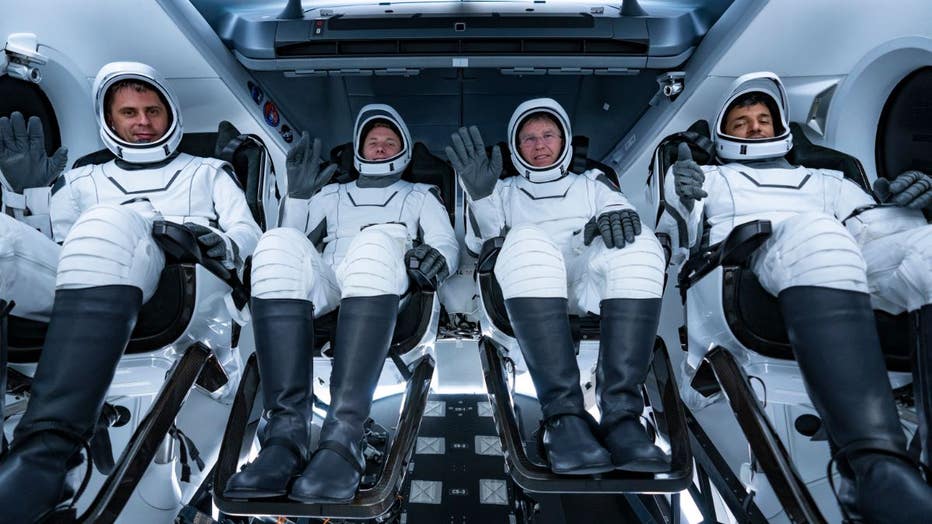Watch again: NASA's SpaceX Crew-6 lifts off from Florida, now bound for space station

NASA's SpaceX Crew-6 lifts off from Florida
SpaceX launched four astronauts to the International Space Station for NASA on Thursday, including the first person from the Arab world going up for an extended monthslong stay. The Falcon rocket bolted from Kennedy Space Center shortly after midnight, illuminating the night sky as it headed up the East Coast.
CAPE CANAVERAL, Fla. - SpaceX launched four astronauts to the International Space Station for NASA on Thursday, including the first person from the Arab world going up for an extended monthslong stay.
The Falcon rocket bolted from Kennedy Space Center shortly after midnight, illuminating the night sky as it headed up the East Coast.
Nearly 80 spectators from the United Arab Emirates watched from the launch site as astronaut Sultan al-Neyadi - only the second Emirati to fly to space - blasted off on his six-month mission. Half a world away in Dubai and elsewhere across the UAE, schools and offices planned to broadcast the launch live.
Also riding the Dragon capsule that's due at the space station on Friday: NASA's Stephen Bowen, a retired Navy submariner who logged three space shuttle flights, and Warren "Woody" Hoburg, a former research scientist at Massachusetts Institute of Technology and space newbie, and Andrei Fedyaev, a space rookie who's retired from the Russian Air Force.
The first attempt to launch them was called off Monday at the last minute because of a clogged filter in the engine ignition system.

Woman canceled her Italy trip to watch Crew-6 rocket launch
Several people make their way to Jetty Park to see the second launch attempt of NASA's SpaceX Crew-6 rocket launch.
They will replace a U.S.-Russian-Japanese crew that has been up there since October. The other station residents are two Russians and an American whose six-month stay was doubled, until September, after their Soyuz capsule sprang a leak. A replacement Soyuz arrived last weekend.

Crew-6 members are positioned in a Dragon Capsule atop a Falcon 9 rocket at launchpad 39A at the Kennedy Space Center on February 27, 2023, in Cape Canaveral, Florida, United States.
Al-Neyadi, a communications engineer, served as backup for the first Emirati astronaut, Hazzaa al-Mansoori, who rode a Russian rocket to the space station in 2019 for a weeklong visit. The oil-rich federation paid for al-Neyadi's seat on the SpaceX flight.
The UAE's minister for public education and advanced technology, Sarah al-Amiri, said the long mission "provides us a new venue for science and scientific discovery for the country."
"We don't want to just go to space and then not have much to do there or not have impact," said the director general of the UAE's space center in Dubai, Salem al-Marri.
The Emirates already have a spacecraft orbiting Mars, and a mini rover is hitching a ride to the moon on a Japanese lander. Two new UAE astronauts are training with NASA's latest astronaut picks in Houston.
Saudi Prince Sultan bin Salman was the first Arab in space, launching aboard shuttle Discovery in 1985. He was followed two years later by Syrian astronaut Muhammed Faris, launched by Russia. Both were in space for about a week.
Al-Neyadi will be joined this spring by two Saudi astronauts going to the space station on a short private SpaceX flight paid by their government.
"It's going to be really exciting, really interesting" to have three Arabs in space at once, he said last week. "Our region is also thirsty to learn more."
He's taking up lots of dates to share with his crewmates, especially during Ramadan, the Muslim holy month which begins this month. As for observing Ramadan in orbit, he said fasting isn't compulsory since it could make him weak and jeopardize his mission.
Bowen, the crew's leader, said the four have jelled well as a team despite differences between their countries. Even with the tension over the war in Ukraine, the U.S. and Russia have continued to work together on the space station and trade seats on rides there.
"It's just tremendous to have the opportunity to fly with these guys," Bowen said.

